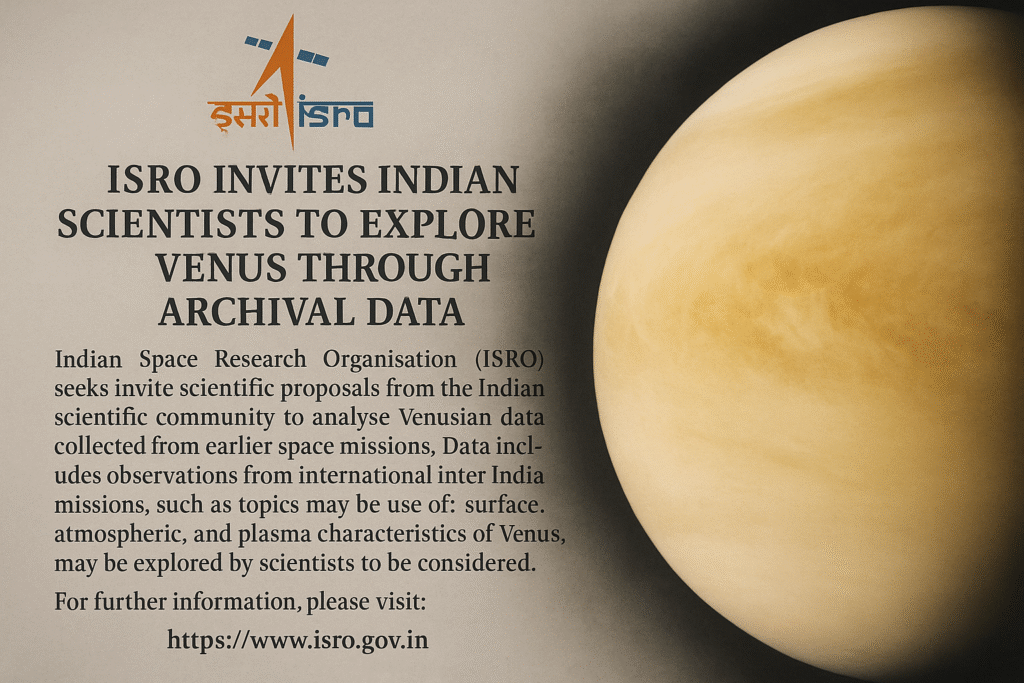By Harshit | 28 September 2025 | Bengaluru, India | 8:45 IST
The Indian Space Research Organisation (ISRO), India’s premier space research agency, has issued an Announcement of Opportunity (AO) inviting Indian scientists to utilise archival data from past Venus missions. This initiative is part of ISRO’s broader strategy to expand planetary research beyond the Moon and Mars, paving the way for India’s upcoming Venus Orbiter Mission (VOM).
A Step Toward Venus Exploration
Last year, the Indian Cabinet approved the development of the Venus Orbiter Mission, a project designed to deepen scientific understanding of Earth’s neighboring planet. While India has previously focused on lunar and Martian missions, VOM represents a strategic step toward exploring Venus, enabling the country to contribute new insights into planetary atmospheres, geology, and space weather interactions.
Through the AO, ISRO aims to engage the wider scientific community in India, encouraging novel research using the rich archives of past Venus data. In an official statement, the agency said:
“In order to promote, strengthen, and increase the scientific user community for the Venus Orbiter Mission, ISRO invites researchers through the AO call for promoting the analysis and modelling of archival data available for the planet Venus.”
Areas of Research Interest
The AO outlines several areas in which proposals are particularly encouraged:
- Venusian Morphology, Topography, and Sub-Surface Studies – Researchers can analyse surface features, landforms, and the structure beneath the planet’s crust to better understand its geological history.
- Geological Mapping, Mineralogy, and Surface Composition – Studies that investigate Venusian rock types, mineral composition, and surface chemistry are encouraged to identify key differences and similarities with Earth.
- Atmosphere Structure, Dynamics, and Composition – Proposals can explore Venusian atmospheric layers, circulation patterns, chemical makeup, and climate dynamics, which remain partially understood due to the planet’s dense, greenhouse-gas-rich environment.
- Ionosphere and Solar Wind Interaction – Projects that examine the interaction between the Venusian ionosphere and solar wind can provide insights into the planet’s magnetosphere and atmospheric loss mechanisms.
- Modelling of Atmospheres and Ionospheres – Simulation-based studies of Venusian atmospheric processes and ionospheric dynamics will help predict environmental behavior and prepare for future in-situ observations from VOM.
Who Can Submit Proposals
The AO is open to individual researchers or groups of scientists and academicians affiliated with national institutions, universities, colleges, planetaria, and government organizations within India. However, certain eligibility criteria apply: principal investigators must have a minimum remaining service of four years before superannuation.
Proposals must be submitted through the Head of the Institution, accompanied by assurances that the necessary facilities will be provided to complete the project. ISRO emphasizes collaboration and robust institutional support to ensure the feasibility of proposed research.
Project Duration and Expectations
The projects under this AO are expected to be completed within three years. Researchers are encouraged to develop detailed work plans, with clear milestones, objectives, and deliverables, ensuring that findings can be integrated into VOM mission planning and future Venusian studies.
Strengthening India’s Planetary Science Community
By opening its archives for new research, ISRO is fostering a culture of collaboration and scientific inquiry among Indian researchers. The AO not only provides opportunities for innovation but also aims to expand the pool of scientists who will directly contribute to India’s Venus exploration program.
Experts note that Venus remains one of the least understood planets in our solar system. Its dense atmosphere, extreme surface temperatures, and unique geological features make it a challenging yet compelling target for planetary science. By engaging researchers now, ISRO hopes to build a foundation of expertise that will maximize the scientific return from the Venus Orbiter Mission.
What’s Next
Researchers interested in submitting proposals should carefully review the AO guidelines and coordinate with their institutions. Selected projects will contribute directly to modelling, analysis, and interpretation of Venusian data, potentially guiding mission planning and future observations.
With this initiative, India strengthens its position in global planetary science while inspiring the next generation of researchers to explore uncharted worlds. By leveraging existing datasets, the country is taking an important step toward understanding Venus — a planet that continues to intrigue and challenge scientists worldwide.

